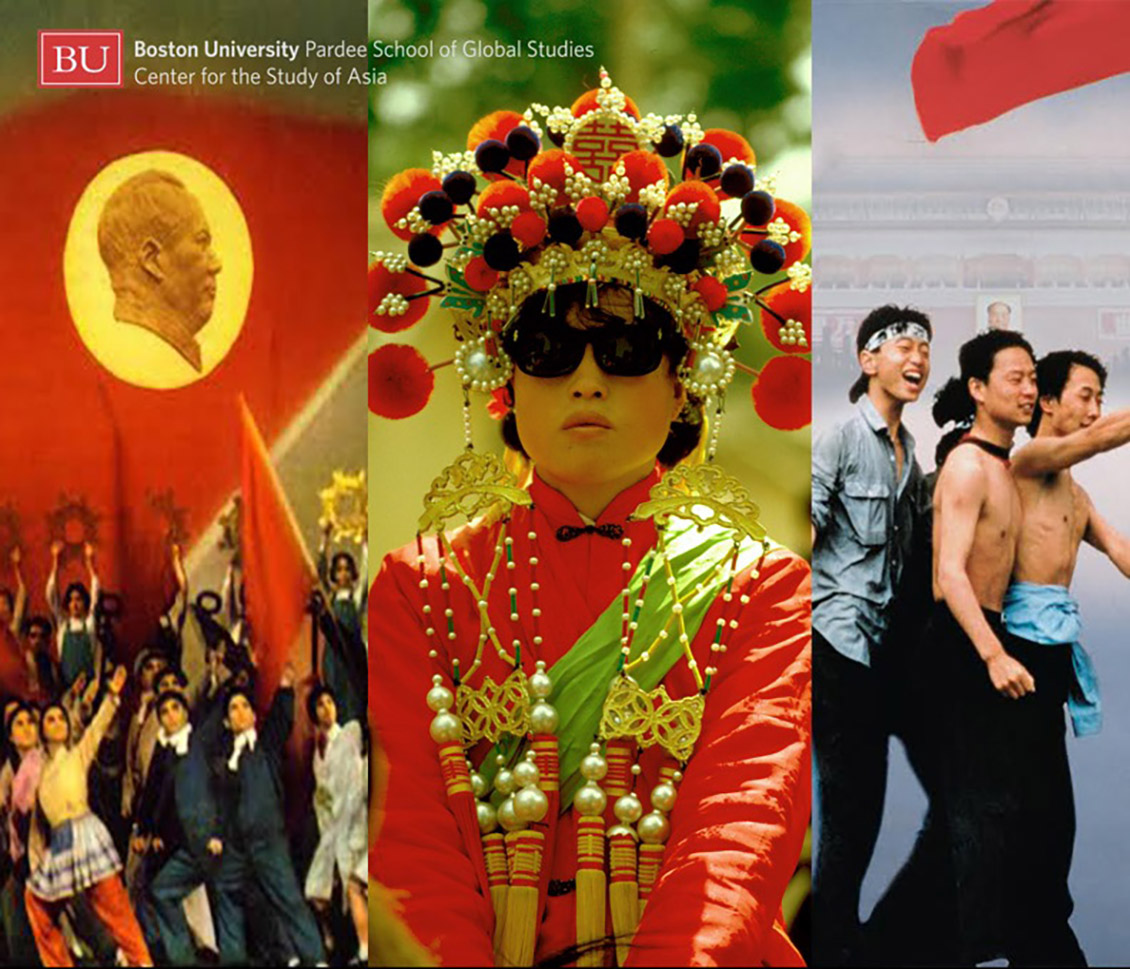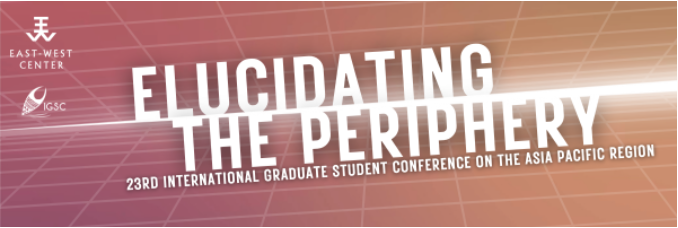History in Images, History in Words: In Search of Facts in Documentary Filmmaking
History in Images, History in Words:
In Search of Facts
in Documentary Filmmaking
A lecture by Carma Hinton
Robinson Professor of Visual Culture and Chinese Studies at George Mason University
Monday April 10, 2017 from 4-7 pm
at the Photonics Center (9th fl.), 8 St. Mary’s Street, Boston University
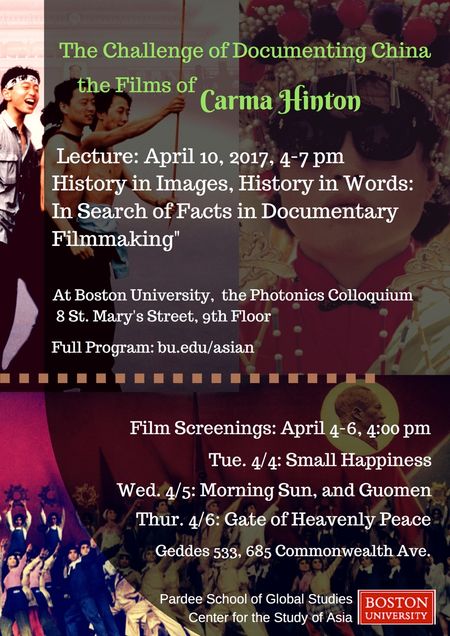 My presentation will focus on the process of documentary filmmaking, especially the many challenges my team and I faced in trying to create engaging filmic narratives that are both factually accurate and encompass multiple perspectives. I will use excerpts from my films as well as out-takes to illustrate the difficulties in determining what information to include and exclude, assess the compromises involved in the choices, and explore the consequences of taking various possible paths. I will also address the different problems that a historian encounters when presenting history in images as opposed to in words: the potential and limitation of each medium and what information each might privilege or obscure. I believe that in this age of “alternative facts” and “parallel universes,” reflections on the challenges in obtaining authenticity and truth and the importance of relentlessly striving to reach this goal, take on particularly urgent meaning.
My presentation will focus on the process of documentary filmmaking, especially the many challenges my team and I faced in trying to create engaging filmic narratives that are both factually accurate and encompass multiple perspectives. I will use excerpts from my films as well as out-takes to illustrate the difficulties in determining what information to include and exclude, assess the compromises involved in the choices, and explore the consequences of taking various possible paths. I will also address the different problems that a historian encounters when presenting history in images as opposed to in words: the potential and limitation of each medium and what information each might privilege or obscure. I believe that in this age of “alternative facts” and “parallel universes,” reflections on the challenges in obtaining authenticity and truth and the importance of relentlessly striving to reach this goal, take on particularly urgent meaning.
About the speaker:
Carma Hinton is an art historian and a filmmaker. She received her Ph.D. in Art History from Harvard University and is now Robinson Professor of Visual Culture and Chinese Studies at George Mason University. Together with Richard Gordon, Hinton has directed many documentary films, including Small Happiness, All Under Heaven, To Taste a Hundred Herbs, Abode of Illusion: The Life and Art of Chang Dai-chien, The Gate of Heavenly Peace, and Morning Sun. She has won two Peabody Awards, the American Historical Association’s John E. O’Connor Film Award, the International Critics Prize and the Best Social and Political Documentary at the Banff Television Festival, and a National News & Documentary Emmy, among others. Hinton is currently working on a book about Chinese scrolls depicting the theme of demon quelling. Carma Hinton was born in Beijing. Chinese is her first language and culture.

Objects of Addiction: Opium, Empire, and the Chinese Art Trade (Harvard Art Museums, Sept 15, 2023–Jan 14, 2024)
A special section of the exhibition investigates parallels between China’s opium crisis and the opioid epidemic in Massachusetts today. We invite visitors to share their thoughts and personal experiences in this space. A range of public programs throughout the fall will encourage community discussion around the opioid crisis, the effects of the Opium Wars on U.S.–China relations, the role of opium in Chinese exclusion in the United States, and art collecting practices. In addition, the artist collective 2nd Act will present a series of substance use prevention workshops, and the Cambridge Public Health Department and Somerville Health and Human Services Department will host trainings on the use of naloxone (Narcan) to reverse opioid overdoses.
This exhibition features works from the collections of the Harvard Art Museums. In addition, loans have been generously provided by the Peabody Museum of Archaeology and Ethnology, Fine Arts Library, Harvard-Yenching Library, Economic Botany Library of Oakes Ames, Houghton Library, and Baker Library (all at Harvard), as well as by the Forbes House Museum, the Ipswich Museum, and Mr. and Mrs. James E. Breece III.
Curated by Sarah Laursen, Alan J. Dworsky Associate Curator of Chinese Art, Harvard Art Museums; with contributions from Harvard students Emily Axelsen (Class of 2023), Allison Chang (Class of 2023), and Madison Stein (Class of 2024), who were instrumental in the early development and planning of this exhibition. We are also grateful to the community members, students, and scholars who lent their time and expertise.
Support for the exhibition is provided by the Alexander S., Robert L., and Bruce A. Beal Exhibition Fund; the Robert H. Ellsworth Bequest to the Harvard Art Museums; the Harvard Art Museums’ Leopold (Harvard M.B.A. ’64) and Jane Swergold Asian Art Exhibitions and Publications Fund and an additional gift from Leopold and Jane Swergold; the José Soriano Fund; the Anthony and Celeste Meier Exhibitions Fund; the Gurel Student Exhibition Fund; the Asian Art Discretionary Fund; the Chinese Art Discretionary Fund; and the Rabb Family Exhibitions Fund. Related programming is supported by the M. Victor Leventritt Lecture Series Endowment Fund. The accompanying booklet was made possible by generous support from Mr. and Mrs. James E. Breece III. Additional support for this project is provided by the Dunhuang Foundation.
For full details, see https://harvardartmuseums.org/exhibitions/6265/objects-of-addiction-opium-empire-and-the-chinese-art-trade
History Dept. Welcomes New Faculty: Professor Jilene Chua
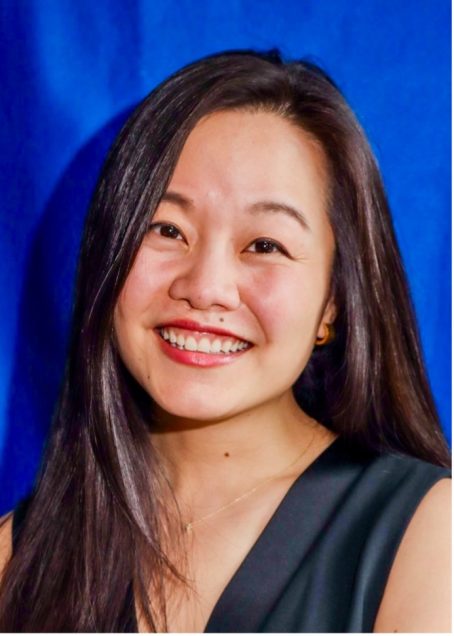
by Molly I. German,
The History Department is excited to announce that Jilene Chua will be joining our faculty as Assistant Professor of History!
Jilene Chua is a socio-cultural legal historian of US race and empire, focusing on the Philippines. She was born in Manila—the capital city of the Philippines—and largely grew up in Richland, Washington. Her current project investigates how Chinese migrants troubled US empire in the Philippines in the first half of the twentieth century. In response to scholarship that has predominantly emphasized the Philippines as a US colony, she argues that the Philippines were also part of vibrant and longstanding Southeast Asian networks which complicated and, sometimes, undermined US colonial governance. This research has benefitted from her background as a Philippine Hokkien speaker; time she spent re-learning Tagalog at the University of Wisconsin-Madison’s Southeast Asian Studies Summer Institute (SEASSI); and from being a Visiting Researcher at the Center for Southeast Asian Studies in Kyoto University (Japan) and at the Ateneo de Manila University (Philippines). Her project has also received support from the Fulbright Program, the American Society for Legal History, the Society for Historians of American Foreign Relations, among others. This June, she will complete her PhD in History from Johns Hopkins University. At BU, she will teach courses related to Asian American history, the Philippines, and comparative racial regimes.
This fall, Professor Chua will be teaching HI 372: Power and Pleasure in Asian America and HI 400 B1: Topics in History (Paper Children, Tiger Parents: Capitalism and Asian American Families).
Click here to see the original History Dept. posting.
K-Pop: A Century in the Making, with Pil Ho Kim (Ohio State Univ) (Oct. 25, 2023)
K-pop's sustained global popularity from Psy's "Gangnam Style" to BTS has piqued curiosity of many about its origins and transformations. This talk takes an expansive view of K-pop as an abbreviation of Korea's century-long musical tradition - from early twentieth-century folk songs, Japanese colonial-era jazz, 1960s' rock and soul from the U.S. military bases in South Korea, to the emergence of home-grown musicians who would become the masterminds of K-pop entertainment company juggernauts. It is a tradition full of shapeshifting crossovers, ingenious hybridities, and intercultural collaborations, all of which have served as key ingredients to K-pop's meteoric rise.
K-Pop: A Century in the Making
Pil Ho Kim
(Associate Professor in Korean, Department of East Asian Languages and Literatures, The Ohio State University)
Wednesday, October 25, from 5-6:30 pm
121 Bay State Road, Riverside Room

Please register by scanning the QR code or Please register here
Gion Matsuri: Japan’s Most Beloved Festival (Japan Society of Boston virtual event, Aug. 24, 2023)
Gion Matsuri: Japan's Most Beloved Festival
August 24, 2023 at 6:00 p.m. ET
Location: Online

About the Event:
 Gion Matsuri is the biggest Japanese festival that millions of people all over the world travel to see, braving the heat and humidity of Japan’s ancient capital.
Gion Matsuri is the biggest Japanese festival that millions of people all over the world travel to see, braving the heat and humidity of Japan’s ancient capital.
Join the Japan Society of Boston as we continue our exploration of Japanese festivals with the most famous and beloved one of all. Started in the 9th century to drive out plague, every summer Kyoto’s Gion district holds this festival during the entire month of July.
This is a free, hour-long presentation with Q&A hosted on Zoom.
Special thanks to the Kyoto Consortium for Japanese Studies where students are encouraged to engage with the local community and participate in major cultural events such as Gion Matsuri.
Christopher Ellars
 Christopher Ellars was a student of the Kyoto Consortium for Japanese Studies at Doshisha University during the months of June and July in 2023. Christopher is happy to share with the JSB community the wonders of Japan’s most magical summer festival.
Christopher Ellars was a student of the Kyoto Consortium for Japanese Studies at Doshisha University during the months of June and July in 2023. Christopher is happy to share with the JSB community the wonders of Japan’s most magical summer festival.
Please note that we often take photographs at events for our records and sometimes for use in public media such as Facebook and blog posts. Registering for an event generally signifies acknowledgment that your likeness may be used in these ways. If you are not comfortable with this, please let us know and we can accommodate you.
As part of registering, we ask for your email address. Your email address will not be sold or given to third parties without your permission. By registering with your email address, you may receive emails from the Japan Society of Boston, including updates about event details , announcements about other upcoming events, and special offers. Please be in touch with us anytime to change your email preferences.
For additional event information, click here
Inside the Japanese House (Japan Society of Boston virtual event, Sept. 12, 2023)
Inside the Japanese House: Part I
September 12, 2023 at 6:00 PM ET
Location: Online

About the Event:
 The Japan Society of Boston is proud to present Inside the Japanese House, a three-part series exploring traditional Japanese homes through the lens of Architecture, Culture, and Handcraft. The series will be hosted by Adam Zgola, a carpenter specialized in traditional Japanese wooden construction with over two decades of experience in Japan.
The Japan Society of Boston is proud to present Inside the Japanese House, a three-part series exploring traditional Japanese homes through the lens of Architecture, Culture, and Handcraft. The series will be hosted by Adam Zgola, a carpenter specialized in traditional Japanese wooden construction with over two decades of experience in Japan.
Part I will delve into Adam’s early experiences as an apprentice craftsman in Japan. We will discuss the opportunities and challenges of a Japanese apprenticeship, a process that results in a unique insight in the importance of tradition in handcraft and the responsibilities of craftsmen in the context of culture and society.
In Part I, Adam will discuss and show several real life projects while sharing how these experiences shaped and defined his views on craft and architecture.
Stay tuned for Part II and III of the series to be held in October and November of 2023. The continuation of Inside the Japanese House will cover topics including, but not limited to, Japanese house styles, history and changes over time, Japanese handcraft tradition, and sustainability within the industry.
Please join us for this very special one-of-a-kind seminar series. This is a free, hour-long presentation with Q&A hosted on Zoom. Once registered, the Zoom link will be in your confirmation email.
Adam Zgola
 Adam Zgola specializes in Japanese wooden construction. Trained as a craftsman through a Japanese apprenticeship, his understanding of traditional architecture benefits from an access to generations of accumulated wisdom. Having spent 21 years studying and building in Japan, Adam is sensitive to the cultural and environmental influences that shaped this iconic architecture.
Adam Zgola specializes in Japanese wooden construction. Trained as a craftsman through a Japanese apprenticeship, his understanding of traditional architecture benefits from an access to generations of accumulated wisdom. Having spent 21 years studying and building in Japan, Adam is sensitive to the cultural and environmental influences that shaped this iconic architecture.
He is active in the protection of historical buildings through restoration efforts and educational programs. As well, Adam is committed to maintaining the relevance of traditional skills and methods by applying them successfully in a modern context.
As a philosophy, he feels that it is important to return to the idea of the house as handcraft: a more sustainable and holistic understanding which fosters a deeper connections with the spaces in which we live, grow, and raise our families.
Please note that we often take photographs at events for our records and sometimes for use in public media such as Facebook and blog posts. Registering for an event generally signifies acknowledgment that your likeness may be used in these ways. If you are not comfortable with this, please let us know and we can accommodate you.
As part of registering, we ask for your email address. Your email address will not be sold or given to third parties without your permission. By registering with your email address, you may receive emails from the Japan Society of Boston, including updates about event details , announcements about other upcoming events, and special offers. Please be in touch with us anytime to change your email preferences.
For additional information, click here
Central Asian Archaeology and Cultural Heritage delegation visits BU (July 17, 2023)
The Pardee School of Global Studies and the CAS Archaeology Program hosted a visiting delegation of cultural heritage specialists from Kazakhstan, Kyrgyz Republic, Tajikistan, and Uzbekistan on July 17, 2023. Sponsored by the US State Department's International Visitor Leadership Program, the program "21st Century ChangeMakers: Preserving and Protecting Cultural Heritage and Identities" included the following participants:
• Mr. Rustam Kairyyev (Almaty, Kazakhstan) is the chairman of the Union of Uyghur Youth of Kazakhstan. As chairman, he works on the development and preservation of the culture, traditions, customs, and language of the Uyghur nation. This includes organizing various programs to preserve and protect Uyghur cultural heritage, such as festivals, conferences, and exhibitions. Mr. Kairyyev also works with Uyghur youth, improving their legal literacy and helping them find job opportunities.
• Mr. Aidos Yesmagambetov (Astana, Kazakhstan) is a sculptor for the National Theater Astana Musical and makeup artist for the Roza Baglanova National Concert Hall. In addition, he is a professional photographer and artist who works closely with archaeologists, anthropologists, and museum curators to replicate historically famous figures. Mr. Yesmagambetov created sculptures for several historical sites in Kazakhstan that recreate the history of Central Asia. His sculptures and partnerships with historians contribute to the safekeeping of Kazakh cultural identity. Mr. Yesmagambetov is also interested in applying his expertise to forensic anthropological tasks, working with human remains from archaeological sites. An example of Mr. Yesmagambetov's work can be seen at https://www.youtube.com/watch?v=OjX-ZsL3Mho
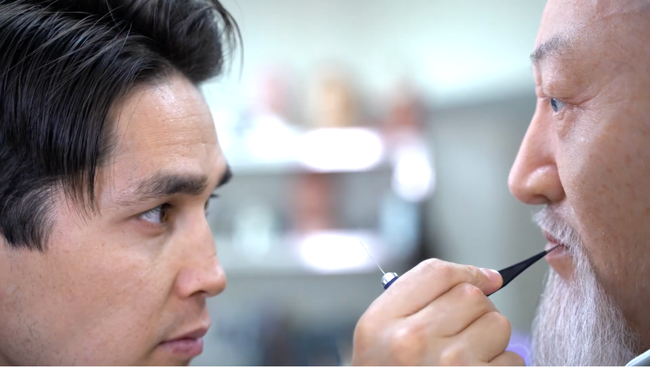
• Mr. Kanat Chinbotoev (Tasharyk Village, Kyrgyz Republic) is the director and founder of the Eldik Murasker Foundation, a community-based organization that aims to protect artifacts of Kyrgyz cultural heritage from export to other countries. His organization engages with local citizens to prevent the sale of cultural treasures to foreign buyers and has raised funds to purchase such items for display at the Manas Ordo historic site in Talas Province.
• Ms. Aisin Duishanalieva (Bishkek, Kyrgyz Republic) is the director of the Republican Inspectorate for the Protection of Historical and Cultural Monuments of the Ministry of Culture of the Kyrgyz Republic. She monitors the condition and use of historical and cultural heritage sites, ensuring compliance with regulations and safety measures during construction work. Ms. Duishanalieva also establishes maintenance protocols and collaborates with stakeholders to safeguard the integrity of heritage sites and cultural artifacts.
• Mr. Abdurahmon Pulotov (Dushanbe, Tajikistan) is a researcher at the National Museum of Antiquities of the Institute for History, Archaeology, and Ethnography of the Academy of Sciences in the Republic of Tajikistan. In addition to his research responsibilities, he is involved in formulating acquisition plans for scientific research. He also contributes to the development of the museum, and to design concepts for displays and exhibitions. Mr. Pulotov delivers lectures on his research related to cultural and national heritage topics.
• Ms. Dilrabo Dadaeva (Tashkent, Uzbekistan) is the divisional leader of the International Relations Division at the Uzarchive agency, the national archives of the Republic of Uzbekistan. She is responsible for fostering collaborations with local and foreign archives and museums, including the United States Holocaust Memorial Museum, and scientific institutions with a particular focus on archiving. Ms. Dadaeva advocates for the digitalization of public services and has spearheaded initiatives that have introduced remote services, facilitating convenient public access to archives of historical materials and data.
• Mr. Muminkhon Saidov (Samarkand, Uzbekistan) is the director of the Samarkand Institute of Archaeology (Agency of Cultural Heritage, Republic of Uzbekistan). He is responsible for developing the strategic vision of the institute’s research. Mr. Saidov oversees, coordinates, and directs multiple archaeological crews during archaeological surveys and excavation projects. Under Mr. Saidov's leadership, numerous archaeologists at the institute undertook excavations with active community engagement. He also lectures on archaeology and conducts outreach programs highlighting the historical significance of archaeological discoveries.
Hosts for Boston University's Pardee School included Robert Murowchick (CAS Archaeology Program), Maria Elena Rivera-Beckstrom and Grant Rhode. The visit was organized and facilitated by WorldBoston and Meridian International Center. The delegation was accompanied by two exceptional interpreters who handled simultaneous translation. Their wide-ranging discussion included the repatriation of looted art and antiquities; cultural heritage protection policies on national and private land; ongoing fieldwork and museum projects and opportunities for student participants; and international publication plans to bring Central Asian cultural heritage protection work to a broader international audience. The delegation is also visiting museums and university programs in Washington DC and Los Angeles.
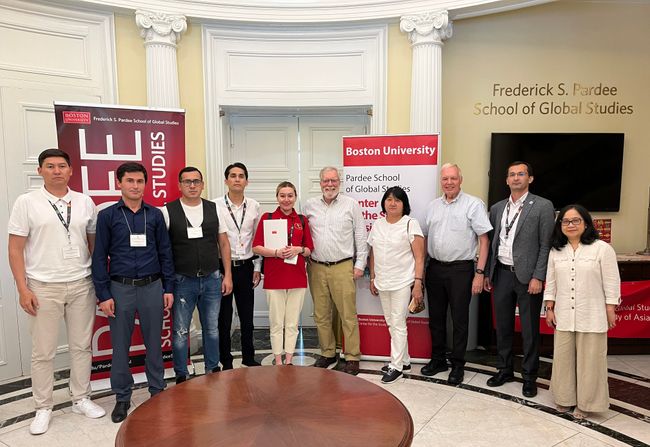
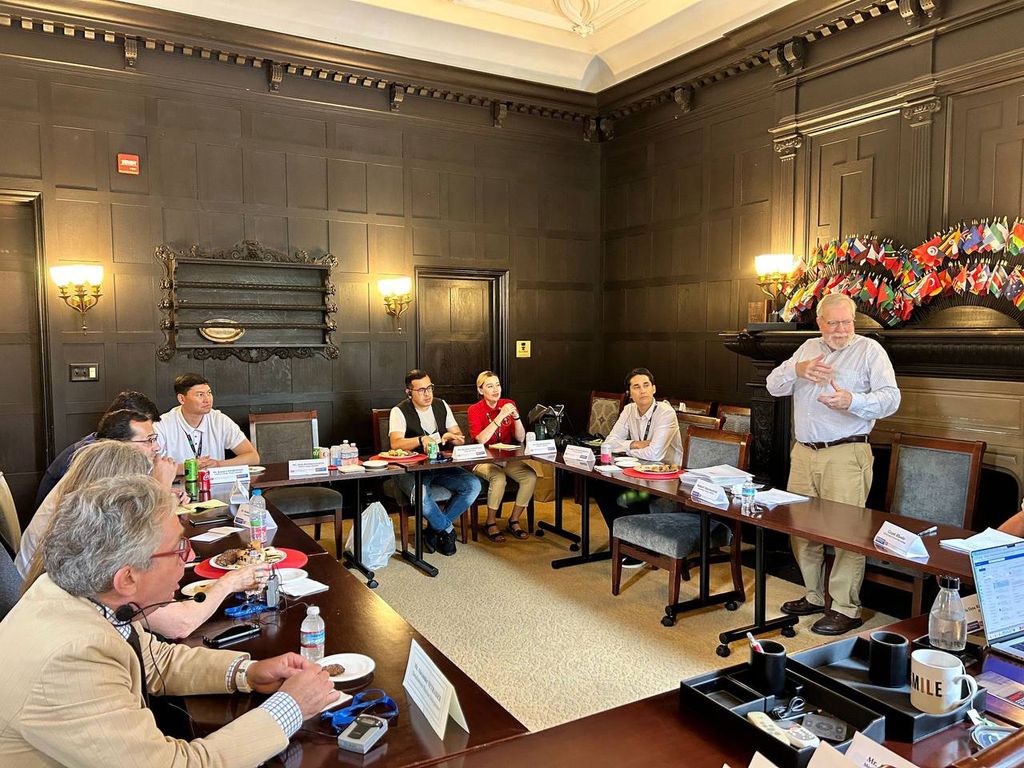
Discussion of new translation of the 1927 Japanese novella “Kappa” by Ryunosuke Akutagawa (Weds. July 19, 2023)
Join translators Lisa Hofmann-Kuroda and Allison Markin Powell
and translator and scholar Anna Zielinska-Elliott (Boston University)
for a discussion and celebration of their release of a new translation of the
1927 Japanese novella Kappa by Ryunosuke Akutagawa
Wednesday, July 19, 2023 at 7:00 pm at
Brookline Booksmith , 279 Harvard St, Brookline, MA 02446
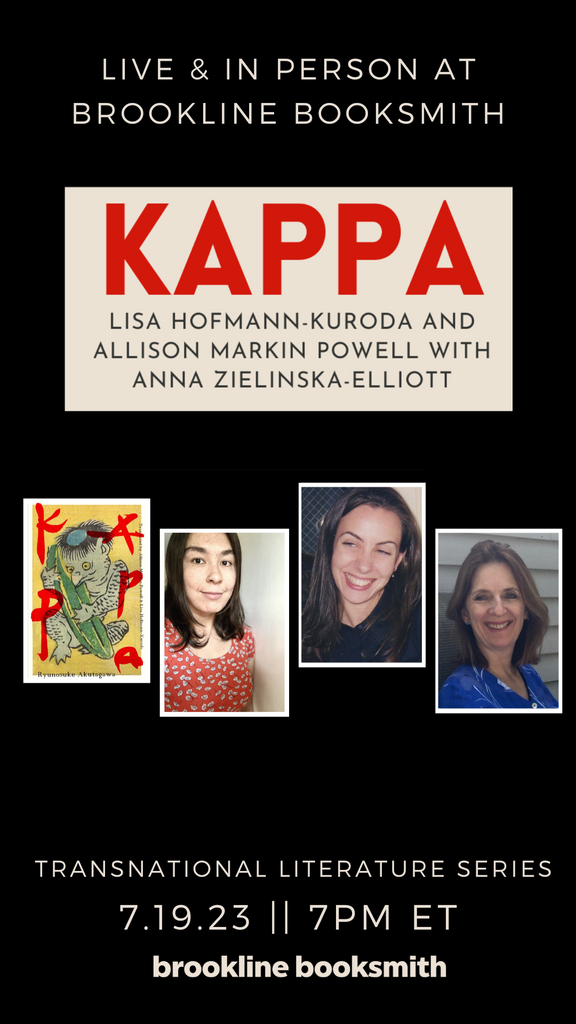
Brookline, MA 02446
617-566-6660
Akutagawa Ryūnosuke, pseudonym Chōkōdō Shujin or Gaki, (born March 1, 1892, Tokyo, Japan—died July 24, 1927, Tokyo), prolific Japanese writer known especially for his stories based on events in the Japanese past and for his stylistic virtuosity.
As a boy Akutagawa was sickly and hypersensitive, but he excelled at school and was a voracious reader. He began his literary career while attending Tokyo Imperial University (now the University of Tokyo), where he studied English literature from 1913 to 1916.
The publication in 1915 of his short story “Rashōmon” led to his introduction to Natsume Sōseki, the outstanding Japanese novelist of the day. With Sōseki’s encouragement he began to write a series of stories derived largely from 12th- and 13th-century collections of Japanese tales but retold in the light of modern psychology and in a highly individual style. He ranged wide in his choice of material, drawing inspiration from such disparate sources as China, Japan’s 16th-century Christian community in Nagasaki, and European contacts with 19th-century Japan. Many of his stories have a feverish intensity that is well-suited to their often macabre themes.
In 1922 he turned toward autobiographical fiction, but Akutagawa’s stories of modern life lack the exotic and sometimes lurid glow of the older tales, perhaps accounting for their comparative unpopularity. His last important work, “Kappa” (1927), although a satiric fable about elflike creatures (kappa), is written in the mirthless vein of his last period and reflects his depressed state at the time. His suicide came as a shock to the literary world.
Akutagawa is one of the most widely translated of all Japanese writers, and a number of his stories have been made into films. The film classic Rashomon (1950), directed by Kurosawa Akira, is based on a combination of Akutagawa’s story by that title and another story of his, “Yabu no naka” (1921; “In a Grove”).
Woman of Tokyo (Tokyo no onna, 1933) Film screening, Harvard Film Archives (Friday July 14, 2023)
Presented by the Harvard Film Archive and Shochiku, in partnership with the Reischauer Institute of Japanese Studies and the Japan Foundation, this screening is part of a complete Ozu Yasujiro retrospective that offers a rare opportunity to see all of Ozu’s extant films screened on 35mm.
Woman of Tokyo (Tokyo no onna), 1933
Live Musical Accompaniment by Martin Marks Screening on Film
With Okada Yoshiko, Egawa Ureo, Tanaka Kinuyo.
Japan, 1933, 35mm, black & white, silent, 47 min.
Japanese intertitles with English subtitles.
Print source: Janus Films
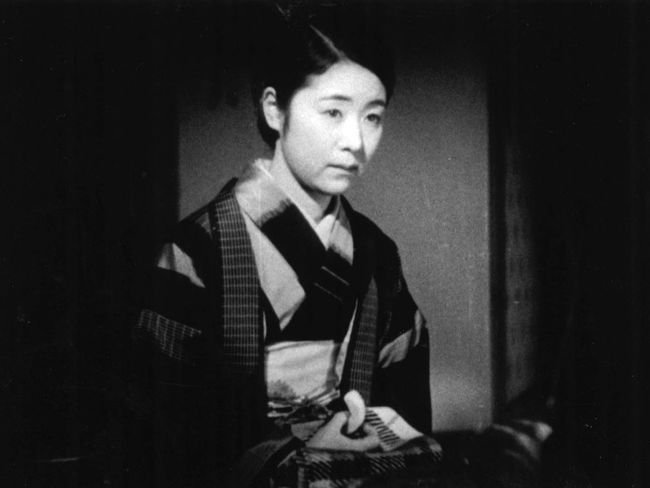
This is part of the program Ozu 120: The Complete Ozu Yasujiro
which runs from June 9 to Aug. 13, 2023. A complete schedule and description can be found here
AIFIS-MSU Conference on Indonesian Studies (July 11-15, 2023, VIRTUAL)
AIFIS-MSU Conference on Indonesian Studies 2023
JULY 11 - 15, 2023 (VIRTUAL)
Conference website: https://www.aifis.org/conference-on-indonesian-studies
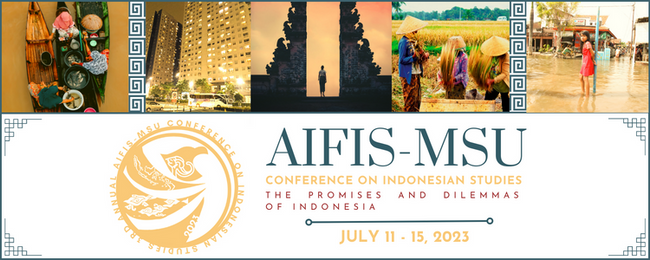
In its third iteration in 2023, the AIFIS-MSU Conference on Indonesian Studies continues to highlight and celebrate the growing and evolving academic study of Indonesia. The conference aims to expand research dissemination and collaboration by connecting Indonesian scholars with international colleagues in a bilingual and virtual format.
This year’s conference theme, “The Promises and Dilemmas of Indonesia,” seeks to inspire reflection on Indonesia’s successes, discontents, and efforts to rework, reinterpret, and negotiate all aspects of civic, legal, and cultural living, against and in light of Indonesia’s internal fractures and frictions and its important profile and positionality globally and in the Asia-Pacific region. The conference seeks to explore and investigate a broad range of topics, including kebangsaan, in its diverse and competing meanings, adat and law, gender and race, environment and climate change, business, politics, and religion, and Indonesia’s place in the world. Indonesia continues to grapple with internal tensions and regresses as she also reaps the rewards of developmental leaps and resilience amidst global uncertainties and adverse challenges from the impacts of the COVID-19 pandemic, shifting geopolitical relations, and economic volatility.
The Conference Program Committee selected a multidimensional theme for our conference, one which is at once capacious enough to welcome and allow for an array of scholars working in/on/from Indonesia to reflect the specificity of Indonesian Studies in our current global climate. We encourage scholars to present research and reflections on the ways scholars of Indonesia historicize the country’s past, navigate current times, and explore imaginative futures and possibilities, all while contributing to the richness of the community’s collective legal and ethical-epistemological frameworks.
-
The deadline for abstract submission passed on April 17. The committee will notify selected participants after May 17.
-
Registration is required for all participants. We have intentionally kept the cost of the conference low to aid in greater access, but will welcome anyone regardless of finances. Please contact the organizers directly to discuss need based access to the conference.
Learn more at our MSU Asian Studies Center partner site, or contact us at conference@aifis.org or asiansc@msu.edu
Register here https://whova.com/portal/registration/summe5_202307/
PLENARY EVENTS:





For full daily event schedule, go to the main conference website https://www.aifis.org/conference-on-indonesian-studies
Second Call for Abstracts | 23rd East-West Center International Graduate Student Conference on the Asia-Pacific (Feb. 15-17, 2024)
|
|
|
|
|
